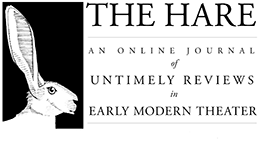I was completely surprised when I found out about this special issue of The Hare, as well as very honored and humbled. To read such detailed and positive accounts of one’s teaching is a once-in-a-lifetime-dream experience for any professor, and I am deeply grateful that I get to hear such thoughtful reflections while I am still around to bask in them!
Of course, these reflections overstate the case, and often give me credit I don’t really deserve. The people who are entitled to the credit for all of the wonderful learning that takes place at Winedale are the students themselves, students like Carra Martinez and the others who contributed their memories to these various pieces. For more than twenty years under my direction, and another thirty under that of Doc Ayres, students have been making a remarkable commitment to explore Shakespeare at Winedale in a detailed, determined, and demanding way, a commitment “costing not less than everything” (as Doc likes to quote from...
